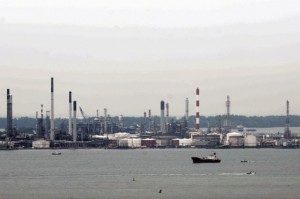Shell remains keen on investing in Philippines
SINGAPORE—Royal Dutch Shell remains keen on investing in its fuel refinery in Batangas, but wants more time to finalize plans.

STILL KEEN ON PHILIPPINES A view of the Royal Dutch Shell's Pulau Bukom offshore petroleum complex in Singapore on September 30, 2011. The company said that while it continues to look at the potential investments in the Philippines, it is also waiting for the Philippine government to issue new fuel standards. AFP PHOTO / ROSLAN RAHMAN
“We are ready actually to work on those investments. We just would like to ask (the Philippine) government to give us sufficient time to make the investments. That is clearly in our plans,” Shell chief executive officer Peter Voser said in a press briefing here.
Voser added that while the company continues to look at the potential investments that can be made in its refinery, it is also waiting for the Philippine government to issue new fuel standards.
However, Voser also said that globally, Shell is looking to sell its smaller refineries and focus on fewer—but larger—units.
It was not made clear how the potential investments in Shell’s Philippine refinery fit in the overall plan.
Meanwhile, Voser said that Shell had a “very successful downstream business in the Philippines including the refinery, a very strong retail side, (as well as) a very well-functioning upstream project.”
Article continues after this advertisementAs such, the company is looking at further opportunities on the retail side, and is even considering the country’s potential natural gas market as this alternative fuel is clearly linked to the overall energy mix of the Philippines.
Article continues after this advertisementEnergy Secretary Jose Rene D. Almendras said separately, however, that there was a possibility that Shell Companies in the Philippines would further downscale its downstream oil business in the country, following the recent divestment of its liquefied petroleum gas unit.
Almendras had said that Shell was “not as happy as they used to be” in conducting business in the country, and acknowledged that should Shell downscale, this was a business decision that the government could not stop.
The energy chief earlier disclosed that there was a question of whether it still makes economic sense to continue operating a refinery in the Philippines, if an oil company can readily buy finished products in the global market.
“There are shifts in trends,” he added.